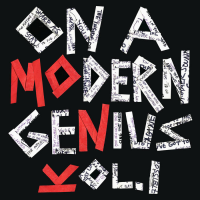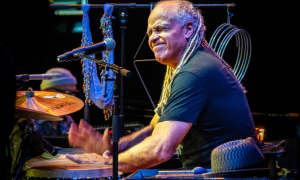Home » Jazz Articles » Live Review » Macedonian National Jazz Orchestra Honors Quincy Jones
Macedonian National Jazz Orchestra Honors Quincy Jones

Courtesy Maja Argakijeva
Macedonian Philharmonic Hall
Skopje, Macedonia
January 24, 2025
The National Jazz Orchestra kicked off its new season with a vibrant homage to

Quincy Jones
arranger1933 - 2024
Quincy Jones was a master arranger, producer, and composer who redefined music across genres. From his groundbreaking work with jazz icons like

Count Basie
piano1904 - 1984

Michael Jackson
vocals1958 - 2009
The orchestra opened with "Moanin,'" a timeless classic that Quincy arranged in 1960. His rich, velvety tone captured the soulful essence of Jones' arrangement, setting the tone for the evening. The audience was immediately drawn into a world where every note felt intentional, every pause pregnant with meaning. During the program, maestro Nikolov announced the use of transcriptions by Finnish arranger Vellu Halkosalmi from the Metropole Orkest Big Band, complemented by his own transcriptions and arrangements. Two original pieces followed, from Jones' The Quintessence (Impulse! Records, 1962) album and it was that moment when the magic truly took hold—"Hard Sock Dance" and "For Lena and Lennie." "For Lena and Lennie," a slow, sultry blues, brought the spotlight to Trajche Velkov on muted trumpet. His solo was understated but profoundly expressive, while Gordan Spasovski's bluesy piano accompaniment created a lush harmonic backdrop. The piece unraveled like a conversation between old friends—intimate and heartfelt.
Then came the showstopper: "Soul Bossa Nova." The iconic opening flute lines, played masterfully by Kiril Kuzmanov and Ivan Ivanov on piccolo flutes, had the audience on their feet. The piece, a timeless classic, pulsated with energy, its infectious rhythm impossible to resist. For a moment, it felt like Jones himself was in the room, guiding the musicians with his inimitable charm.
The evening took a nostalgic turn with "Come Fly with Me," performed by the elegant baritone John Apelgren. Originally sung by

Frank Sinatra
vocals1915 - 1998
The most daring moment of the evening came with an avant-garde reinterpretation of Michael Jackson's "Billie Jean." Far removed from its pop origins, the arrangement fragmented and reassembled its iconic melodies into a dissonant, cacophonous exploration. While it was a bold experiment, I think it ultimately failed to capture the essence of the original. Clearly, you can't always push a song so far from its roots without losing the magic that made it resonate in the first place. Ballads like "The Midnight Sun Will Never Set," featuring a breathtaking solo by Kuzmanov, provided moments of calm introspection, balancing the high-energy numbers. This was contrasted by "The Birth of a Band" a dazzling stomper that was played at a breakneck speed featuring dazzling solos by Ivan Ivanov on tenor saxophone and Viktor Filipovski.
The dynamic feel introduced by the previous song continued with "Let the Good Times Roll," with the girl trio on vocals and Sasho Gigov-Gish, delivering a playful and spirited performance that brought an infectious energy to the finale. This song was marked by a playful, swaggering solo by trombonist Sashko Nikolov. It was the perfect conclusion to a night that had celebrated both the joy and complexity of Jones' music. The orchestra closed the show with "Ai No Corrida" a beautiful and playful song.
For the encore, the orchestra performed "Belly Roll" with its irresistible groove as a medium shuffle blues, featuring standout solos from tenor, trumpet, alto, and guitar. The slippery, sliding unison saxophones brought the melody to life, while the roaring shout chorus capped it off with electrifying energy.
What stood out most was the orchestra's ability to balance fidelity to Jones' original arrangements with fresh interpretations. The musicians' technical skill was matched by their emotional depth, bringing every piece to life with authenticity and passion. The program was a reminder of how Jones' work transcended genres, blending jazz, pop, and classical influences into a cohesive whole. Quincy Jones worked with an astonishing variety of artists, each bringing their unique perspective. Similarly, this performance felt like a collective effort to honor the man who gave so much to the world of music.
Tags
Live Review
Goce Stevkovski
Nenad Georgievski
Macedonia
Skopje
Quincy Jones,
Count Basie
Ray Charles
Michael Jackson,
Frank Sinatra,
Comments
PREVIOUS / NEXT
Support All About Jazz
 All About Jazz has been a pillar of jazz since 1995, championing it as an art form and, more importantly, supporting the musicians who make it. Our enduring commitment has made "AAJ" one of the most culturally important websites of its kind, read by hundreds of thousands of fans, musicians and industry figures every month.
All About Jazz has been a pillar of jazz since 1995, championing it as an art form and, more importantly, supporting the musicians who make it. Our enduring commitment has made "AAJ" one of the most culturally important websites of its kind, read by hundreds of thousands of fans, musicians and industry figures every month.
Go Ad Free!
To maintain our platform while developing new means to foster jazz discovery and connectivity, we need your help. You can become a sustaining member for as little as $20 and in return, we'll immediately hide those pesky ads plus provide access to future articles for a full year. This winning combination vastly improves your AAJ experience and allow us to vigorously build on the pioneering work we first started in 1995. So enjoy an ad-free AAJ experience and help us remain a positive beacon for jazz by making a donation today.

Skopje
Concert Guide | Venue Guide | Local Businesses
| More...







 Buy Now
Buy Now























